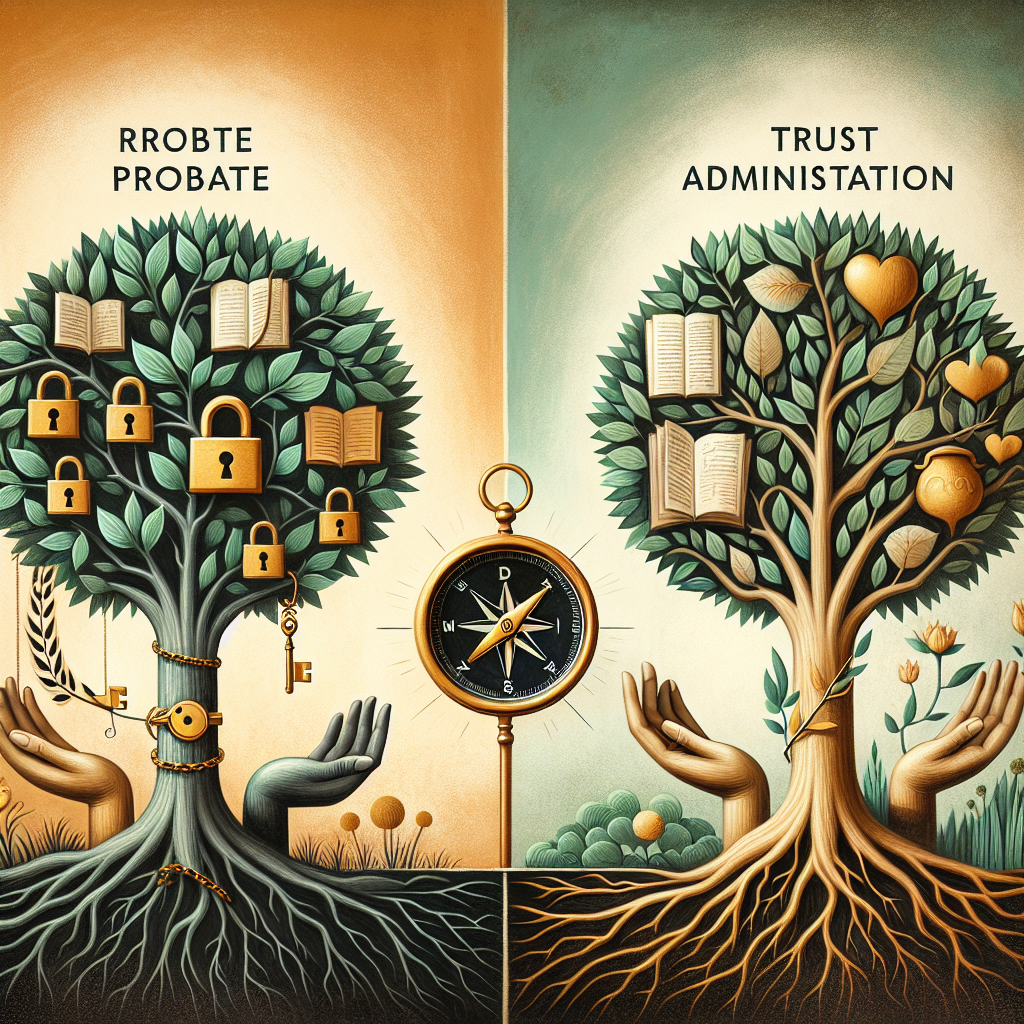
PARENTS & HOMEOWNERS: MY 7-STEP ESTATE PLANNING PROCESS WILL PROTECT YOUR HEIRS
From Creditors, Predators & Bad Choices, And Will Help You Become a (Bigger) Hero to Your Family!



Understanding the Differences Between Probate and Trust Administration
Understanding the Differences Between Probate and Trust Administration
Navigating the complexities of estate planning can feel overwhelming, especially when terms like “probate” and “trust administration” start getting thrown around. Understanding these concepts is crucial for effective estate management and can make a significant difference in how your assets are handled after your passing. In this post, we’ll demystify these terms and help you comprehend the key differences between probate and trust administration. Let’s dive in! 🌟
Table of Contents
1. Introduction to Estate Planning
2. What is Probate?
3. Understanding Trust Administration
4. Key Differences Between Probate and Trust Administration
5. Pros and Cons of Probate
6. Pros and Cons of Trust Administration
7. Conclusion
8. FAQs

Introduction to Estate Planning
Estate planning is about more than just writing a will; it’s about creating a roadmap for your legacy. Whether you are considering setting up a trust or opting for a will that goes through probate, understanding the nuances of each process is essential. Estate planning ensures that your assets are distributed according to your wishes, minimizes tax liabilities, and provides peace of mind for you and your loved ones.

What is Probate?
Probate is a legal process that occurs after someone passes away. It’s the court-supervised method of validating a will, settling debts, and distributing the deceased’s assets to the rightful heirs. The probate process involves several steps:
1. Filing a petition with the probate court.
2. Notifying beneficiaries and creditors.
3. Inventorying the deceased’s assets.
4. Paying any outstanding debts and taxes.
5. Distributing the remaining assets according to the will or state law if there’s no will.
While probate is a standard process for handling a deceased person’s estate, it can be time-consuming and sometimes costly.
Understanding Trust Administration
Trust administration, on the other hand, involves managing a trust created by the deceased, either during their lifetime or upon their death. A trust is a legal arrangement where one party holds assets on behalf of another. The process of trust administration can be less cumbersome than probate because it generally avoids court intervention.
Key components of trust administration include:
1. Notifying beneficiaries of the trust.
2. Assessing and managing trust assets.
3. Paying any debts or taxes owed by the trust.
4. Distributing assets to beneficiaries as stipulated by the trust agreement.
Trusts can provide a more private, efficient means of transferring assets, often avoiding some of the hurdles associated with probate.
Key Differences Between Probate and Trust Administration
The primary differences between probate and trust administration revolve around court involvement, privacy, and duration:
Court Involvement: Probate requires court supervision, while trust administration does not, making the latter generally more streamlined and private.
Privacy: Probate is a public process, meaning anyone can access the details of the estate. Trust administration is private, with only the beneficiaries and trustees involved having access to the details.
Duration: Probate can take months or even years to complete, while trust administration often proceeds more quickly.
Pros and Cons of Probate
Like any process, probate has its advantages and disadvantages:
Pros:
– Provides a structured legal framework for settling debts and distributing assets.
– Offers court oversight, which can be beneficial if disputes arise.
Cons:
– Can be time-consuming and costly due to legal fees and court costs.
– Lack of privacy, as probate proceedings are public records.
Pros and Cons of Trust Administration
Trust administration also presents its own set of benefits and challenges:
Pros:
– Generally faster and more private than probate.
– Can help reduce estate taxes and avoid lengthy court processes.
Cons:
– Setting up a trust can be complex and may require professional assistance.
– Initial costs can be higher compared to drafting a simple will.
Conclusion
Deciding between probate and trust administration depends on your specific circumstances, including the complexity of your estate, your privacy concerns, and your family’s needs. While both serve the purpose of asset distribution, they approach it differently. Consulting with an estate planning attorney can help you make an informed decision that aligns with your goals. Remember, effective estate planning not only safeguards your assets but also provides peace of mind for you and your loved ones. 🏡
FAQs
Q: Can all assets bypass probate through a trust?
A: Not necessarily. Only assets titled in the name of the trust avoid probate. Assets not included in the trust at the time of death may still go through probate.
Q: How long does probate usually take?
A: The probate process can vary widely depending on the estate’s complexity and state laws, typically ranging from several months to over a year.
Q: Is a will necessary if I have a trust?
A: Yes, a “pour-over” will is often recommended to ensure any assets not included in the trust are directed into the trust upon death.
Q: Are trusts only for wealthy individuals?
A: No, trusts can benefit individuals with modest estates by providing privacy, efficiency, and sometimes tax advantages.
Understanding these differences will empower you to make the best decision for your estate planning needs. If you have more questions, feel free to reach out! 📞
Got Questions?
Set up your free, friendly, in-depth legal consultation with estate planning attorney Eric Ridley
